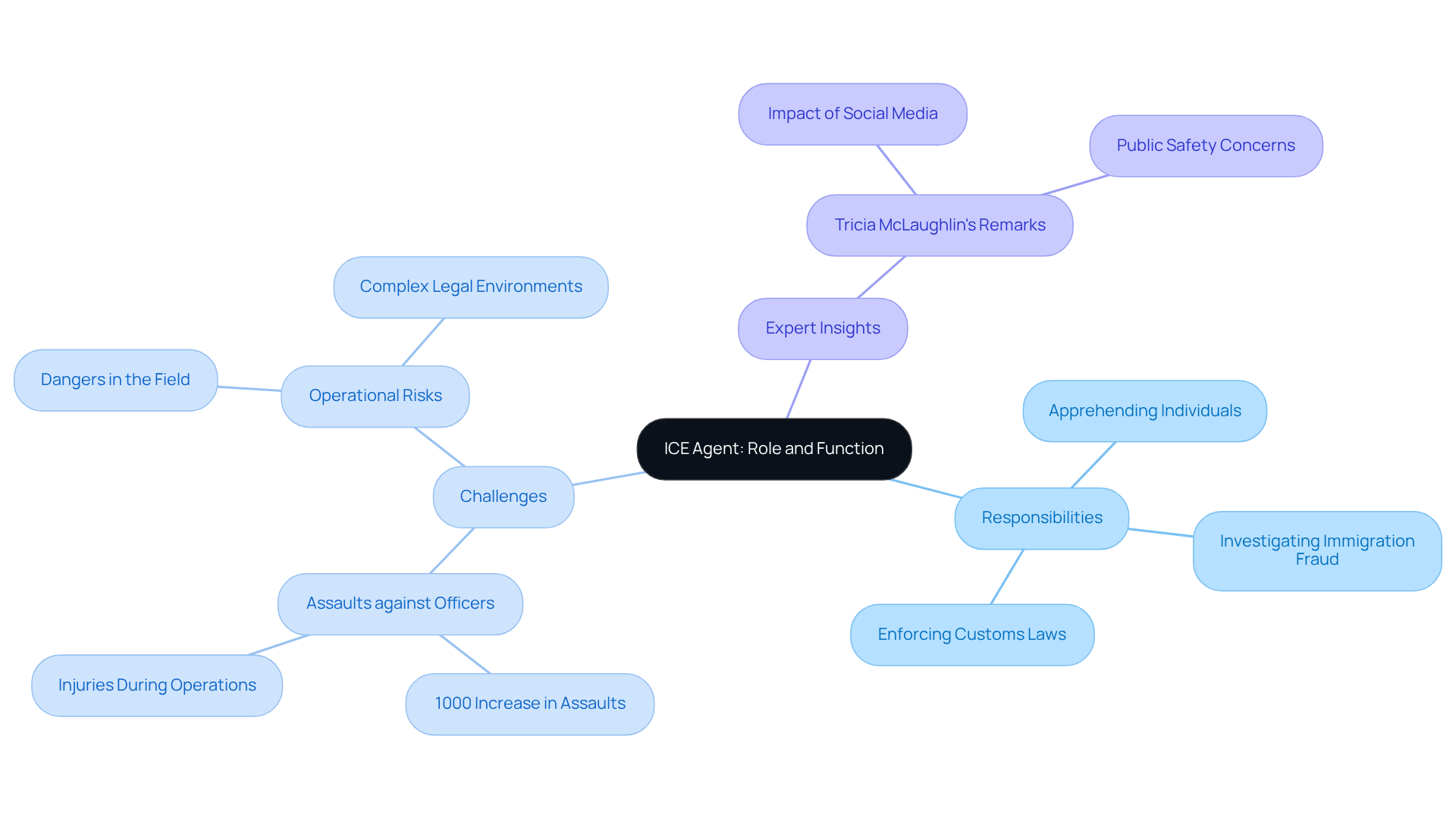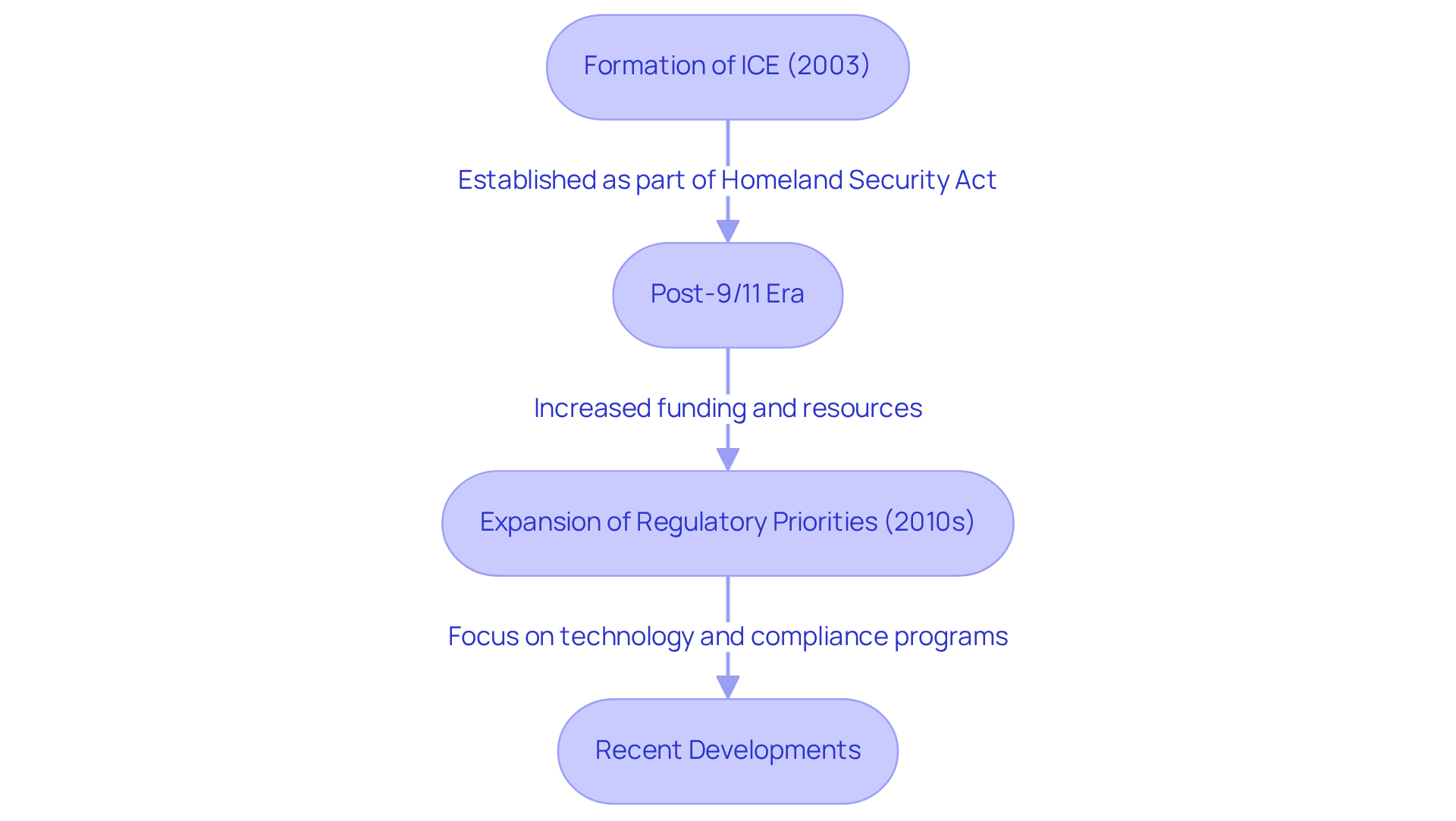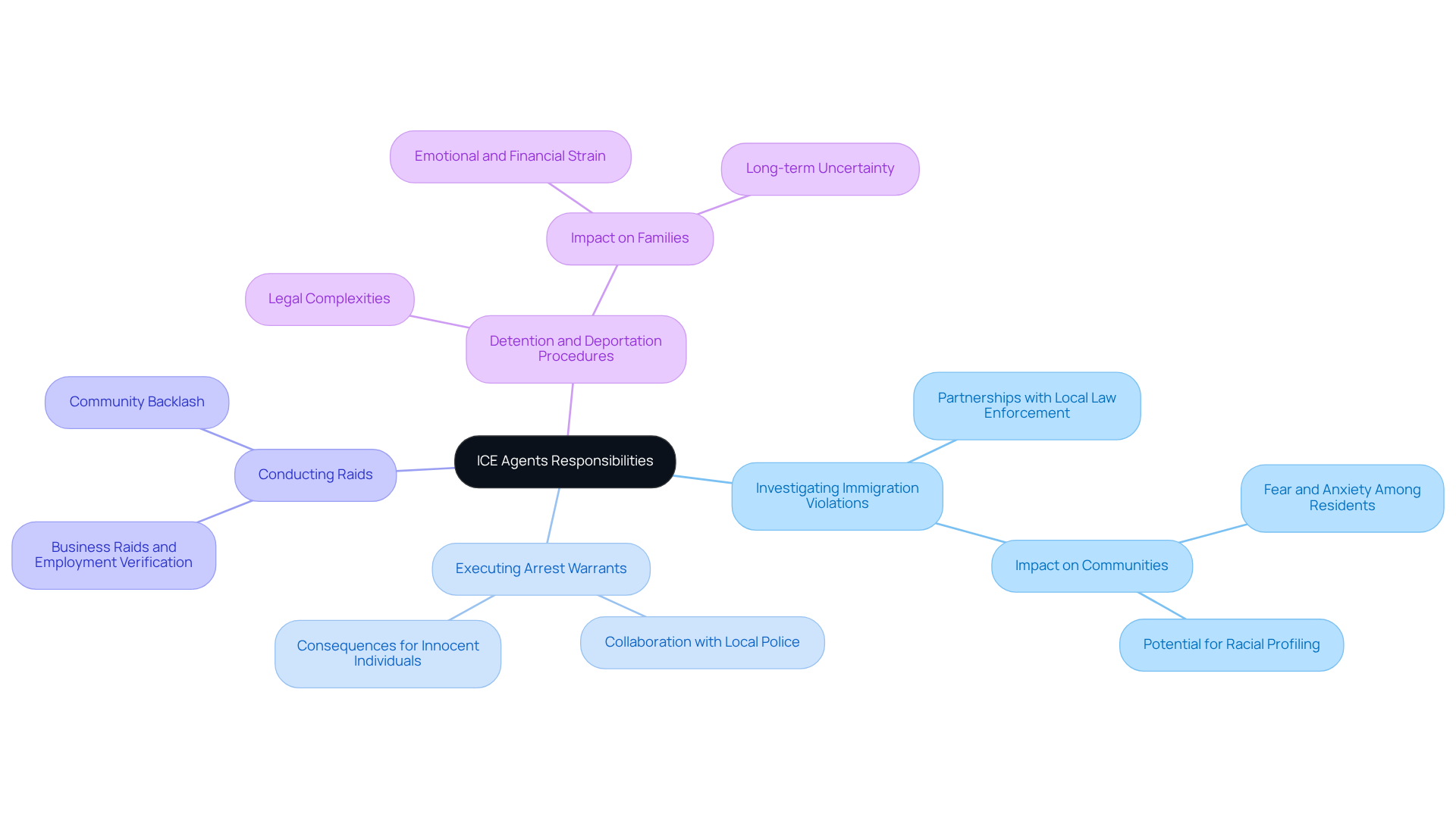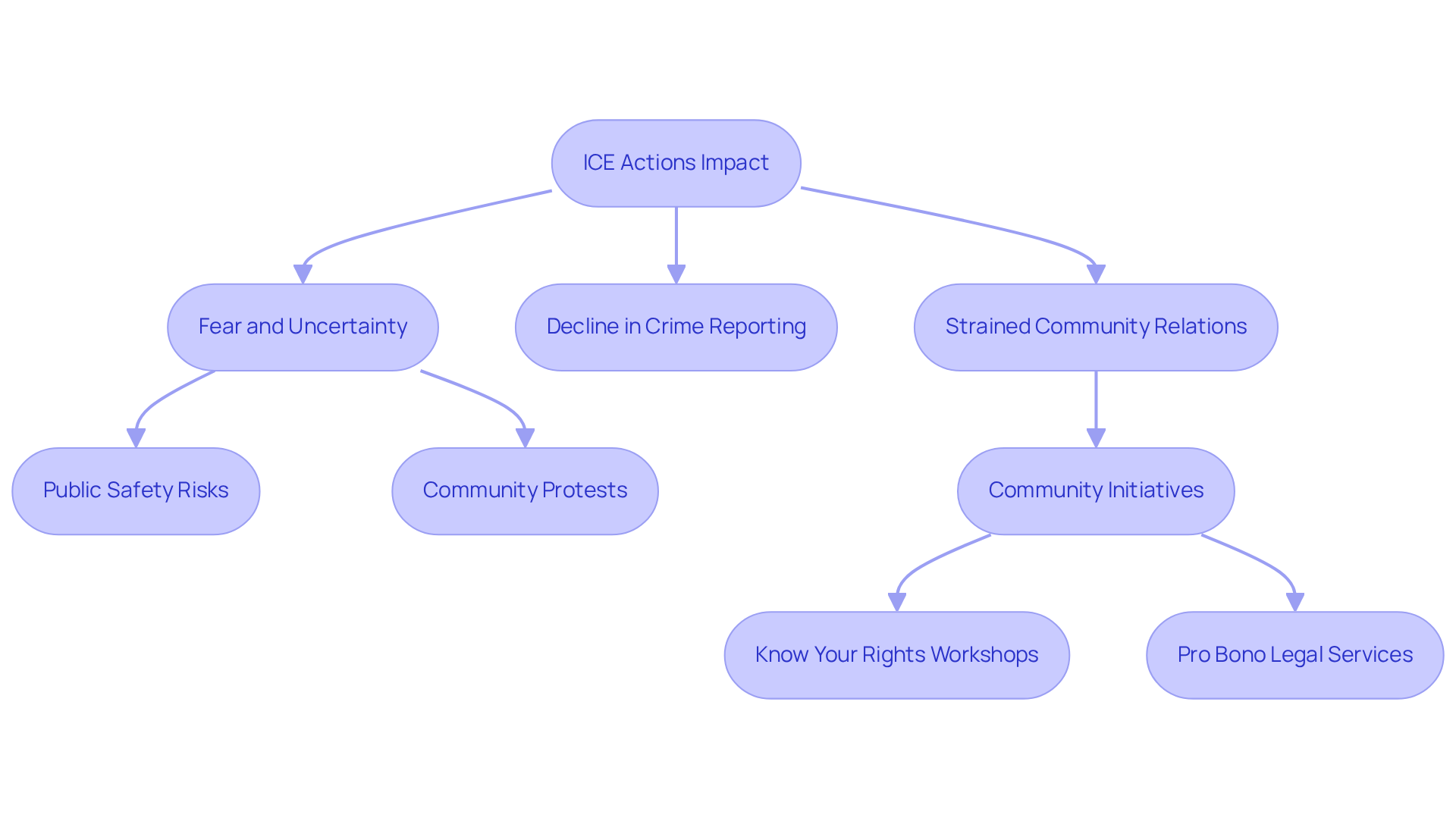Overview
Immigration and Customs Enforcement (ICE) agents play a crucial role as federal law enforcement officers. They are tasked with enforcing immigration laws, investigating customs violations, and apprehending individuals who may be in the country illegally. However, it's important to remember that their responsibilities come with significant challenges. Rising violence against officers and the impact of their operations on community relations can create fear and distrust among immigrant populations.
You may be feeling concerned about how these dynamics affect your community. The multifaceted role of ICE agents is not just about enforcement; it also involves navigating complex emotional landscapes. The experiences of these officers can deeply impact their interactions with the communities they serve, leading to a cycle of fear that affects everyone involved.
As we reflect on these issues, it's essential to foster understanding and dialogue. By acknowledging the challenges faced by ICE agents and the immigrant communities, we can begin to bridge the gap. Together, we can work towards solutions that promote safety and trust. If you or someone you know is affected by these circumstances, seeking legal assistance can be a vital step towards finding support and guidance.
Introduction
Understanding the role of an ICE agent is crucial in today's complex immigration landscape. Their responsibilities extend far beyond mere enforcement of laws, impacting countless lives. As federal law enforcement officers, ICE agents navigate a challenging environment filled with risks, ethical dilemmas, and community implications. It's important to remember that while they serve to uphold public safety, the increasing scrutiny of their operations raises significant questions about the balance between safety and individual rights.
You may be feeling concerned about what it truly means to be an ICE agent. How do their actions shape the lives of families and communities across the nation? This inquiry is not just about policies; it's about real people and their experiences. By exploring these questions, we can foster a deeper understanding of the implications of their work, emphasizing the human element in these complex issues.
Define ICE Agent: Role and Function
What is an ICE agent? An ICE agent, or Immigration and Customs Enforcement agent, serves as a federal law enforcement officer dedicated to and . As part of the Department of Homeland Security (DHS), ICE plays a vital role in the U.S. entry system. These agents work diligently to:
- Apprehend individuals who may be in the country illegally
- Investigate
- Enforce laws related to customs and border protection
Their responsibilities can vary greatly, from conducting raids on workplaces suspected of employing undocumented workers to investigating serious issues like human trafficking and drug smuggling.
It's important to recognize the . Recent reports indicate a staggering 1000% rise in assaults against officers during operational activities, highlighting the inherent risks in their roles. For example, during a traffic stop aimed at detaining a criminal illegal alien, an ICE officer sustained serious injuries when the suspect attempted to flee. This incident underscores the in the field and the dangers they face while carrying out their duties.
Expert insights further emphasize the significance of ICE personnel in the immigration system. Assistant Secretary Tricia McLaughlin remarked, "Viral social media videos and activists encouraging illegal aliens to resist authorities not only spread misinformation but also undermine , as well as the safety of our officers and those being apprehended." This perspective highlights the essential role of ICE personnel in maintaining the rule of law and safeguarding public safety, all while navigating complex legal environments. Additionally, ICE is involved in , showcasing the multifaceted nature of their responsibilities.
You may be feeling concerned about the implications of these operations on public safety and the well-being of those involved. It's crucial to understand what an ICE agent is, as they face to protect the community. Their commitment to is essential in creating a safer environment for everyone.

Trace the Origins and Development of ICE Agents
ICE was established in 2003 as part of the Homeland Security Act, a direct response to the heightened following the September 11 attacks. This crucial moment led to a significant reorganization of , shifting responsibilities from the Immigration and Naturalization Service (INS) to a more unified agency focused on both entry and customs supervision. Initially, ICE's main mission was to prevent terrorism and enforce residency laws, leading to questions about as their role has evolved considerably over the years.
The agency's development can be traced through several key milestones that reflect its journey:
- 2003: Formation of ICE, consolidating various regulatory functions.
- Post-9/11 Era: Increased funding and resources were allocated to ICE, reflecting the urgent need for enhanced security measures. This involved a substantial increase in funding and staff to address the .
- 2010s: Expansion of regulatory priorities, including a focus on with criminal records, which sparked and scrutiny.
- Recent Developments: The introduction of technology and data-driven approaches, such as the SmartLINK mobile application, which utilizes biometric facial comparison technology for identity verification. This app allows participants to upload documents and communicate directly with case specialists. Additionally, the (ATD) program has been implemented to improve compliance and monitoring of non-detained individuals, costing less than $4.20 per day per participant, significantly lower than the approximately $152 per day for detention.
It's important to recognize that what is an ice agent reflects the development of ICE personnel and mirrors wider societal views on the movement of people and enforcement. As public sentiment shifts, so too do the strategies and priorities of ICE, leading to ongoing discussions about the agency's effectiveness and the ethical implications of its methods. Case studies, such as the transition from Family Residential Centers to Family Staging Centers, illustrate the agency's adaptability in response to changing political landscapes and operational challenges. Overall, the evolution of ICE personnel since 2003 highlights a complex interaction between national security, border policy, and community relations. You may be feeling concerned about these changes, and it's essential to understand how they impact individuals and families navigating these systems.

Detail the Responsibilities and Operations of ICE Agents
To understand what is an ice agent, it is important to know that they engage in a variety of critical activities that profoundly impact communities, including:
- Investigating
- Conducting raids on businesses suspected of employing undocumented workers
It's important to recognize that their is crucial, allowing them to identify and capture individuals considered a threat to public safety. In fact, approximately 70 to 75 percent of ICE enforcement actions rely on cooperation from state and local police, highlighting the integral role of these partnerships.
Every year, ICE carries out , emphasizing the importance of addressing criminality and breaches of immigration policies. For instance, between 2015 and 2020, ICE arrested over 674 U.S. citizens, illustrating the broad scope of their operations. You may be feeling concerned to learn that what is an ice agent can have extensive reach, as of June 2025, , indicating the potential .
ICE personnel are also responsible for managing the detention and for individuals found in breach of laws regarding entry. This responsibility involves that require a deep understanding of both federal and state laws. However, the agency's operations are not without controversy; the Trump administration's have led to widespread public backlash and legal challenges, particularly regarding the treatment of detainees and the prioritization of enforcement actions.
Recent developments, such as the signing of the 'One Big Beautiful Bill Act,' which includes funding for hiring 10,000 additional ICE officers, further underscore the ongoing evolution of ICE's operational landscape. As these representatives continue to fulfill their responsibilities, the consequences of their actions reverberate throughout communities, often placing individuals and families in vulnerable circumstances. It’s essential to remain informed and seek support during these challenging times.

Examine the Impact of ICE Agents on Immigration and Community Relations
The actions of ICE agents, which raise the question of what is an ICE agent, deeply impact across the United States, creating an atmosphere filled with fear and uncertainty. Many individuals live in constant dread of , which discourages them from reporting crimes or seeking help from authorities. This widespread fear not only jeopardizes but also fosters a significant divide between immigrant populations and local law enforcement, making collaborative efforts to ensure public security more challenging.
It's important to recognize that statistics show a considerable number of immigrants are hesitant to engage with police due to concerns about ICE involvement, resulting in a decline in crime reporting. Police chiefs nationwide, including those in Minneapolis and Greeneville, have voiced their worries that the fear of deportation prevents law-abiding immigrants from stepping forward as witnesses or victims, ultimately putting at risk.
Moreover, the tactics employed by ICE, such as workplace raids and targeted arrests, have ignited widespread protests and ethical debates surrounding border control. These actions resonate on a personal level and ripple through communities, influencing public policy and shaping the national dialogue on migration reform. The increasing number of , which enable local law enforcement to partner with ICE, has further strained , as many residents fear that such collaborations could lead to more deportations and erode trust between immigrant communities and law enforcement.
In response to these pressing challenges, organizations like are committed to uplifting immigrant communities through initiatives like "" workshops. These workshops educate individuals about their in immigration and other critical areas. The firm partners with local organizations, churches, and schools to provide vital legal resources and support to underserved communities. By offering and scholarships for aspiring legal professionals, the firm is actively fostering a more informed and supportive environment for immigrants. This dedication to accessible legal representation and community education is crucial in rebuilding trust and ensuring that everyone feels safe seeking assistance.
In summary, understanding what an ICE agent is reveals how their presence and operations present significant challenges to community relations, cultivating a climate of fear that undermines public safety and complicates the relationship between immigrants and local authorities. As Harold Medina, police chief in Albuquerque, highlights, building trust within the community is essential. However, it is a process that cannot be rushed, especially in the current environment of fear surrounding ICE enforcement actions.

Conclusion
The role of an ICE agent is multifaceted and critical in maintaining the integrity of the U.S. immigration and customs system. These federal officers not only enforce laws but also navigate complex challenges that arise in their line of duty. It's important to recognize the significant impact they have on both national security and community dynamics.
Throughout this discussion, we highlight the responsibilities of ICE agents, including their involvement in:
- Apprehending undocumented individuals
- Investigating immigration fraud
- Executing arrest warrants
The evolution of ICE since its establishment in 2003 reflects shifting societal views on immigration enforcement and the agency's adaptive strategies in response to national needs. However, the impact of ICE operations on immigrant communities creates a climate of fear, complicating relationships with local law enforcement and undermining public safety.
Recognizing the complexities surrounding ICE agents is essential for fostering informed discussions about immigration policy and community relations. You may be feeling uncertain or anxious about these issues, and it's crucial to engage with them actively. As the landscape of immigration enforcement continues to evolve, seeking legal knowledge and advocating for policies that promote safety and trust becomes even more vital. Understanding the role of ICE agents not only sheds light on their functions but also emphasizes the importance of dialogue and support for all individuals navigating these challenging circumstances. Together, we can foster a community that prioritizes understanding and compassion.
Frequently Asked Questions
What is an ICE agent?
An ICE agent, or Immigration and Customs Enforcement agent, is a federal law enforcement officer dedicated to enforcing border regulations and investigating customs offenses as part of the Department of Homeland Security (DHS).
What are the primary responsibilities of ICE agents?
ICE agents are responsible for apprehending individuals who may be in the country illegally, investigating immigration fraud, and enforcing laws related to customs and border protection. Their duties can include conducting raids on workplaces suspected of employing undocumented workers and investigating serious issues like human trafficking and drug smuggling.
What challenges do ICE agents face in their roles?
ICE agents face significant challenges, including a reported 1000% rise in assaults against officers during operational activities. These risks highlight the dangers encountered in the field, such as during traffic stops aimed at detaining criminal illegal aliens.
What is the significance of ICE personnel in the immigration system?
ICE personnel play a crucial role in maintaining the rule of law and public safety. Their work is essential in navigating complex legal environments and ensuring the enforcement of immigration laws, despite facing opposition and misinformation in public discourse.
How does ICE handle non-criminal civil infractions?
ICE is involved in administrative arrests for non-criminal civil infractions, showcasing the multifaceted nature of their responsibilities beyond criminal investigations.
Why is it important to understand the role of ICE agents?
Understanding the role of ICE agents is important as they face significant challenges while working to protect the community and uphold the law, contributing to a safer environment for everyone.




